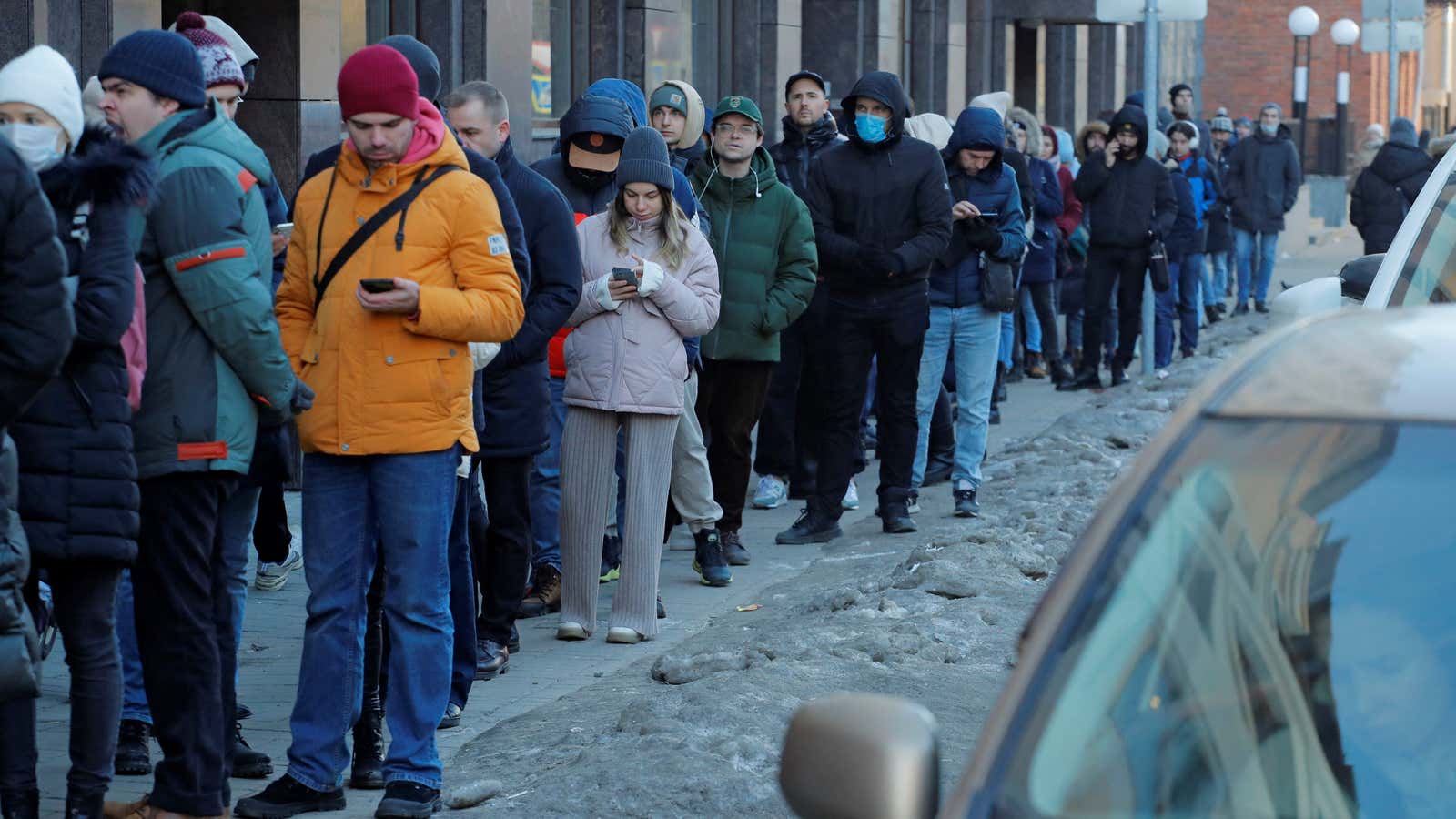For Russians, the collapse of the Soviet Union granted entry into the world of consumer capitalism, and over the past three decades, the middle class has grown increasingly accustomed to the products and services of the West.
The US and European sanctions on Russia, over its invasion of Ukraine, will hinder the ability of Russian oligarchs to conduct business as usual. Higher prices, caused by a crashing ruble and the prospect of inflation, will hurt the poor; even before the invasion, the West’s prior sanctions on Russia, over its annexation of the Crimea, had already raised poverty levels in the country.
The middle class, though, is feeling a slow, certain squeeze: a gradual severance from the Western brands and products they’ve come to rely on. “The older generation tells me that they lived through the 1990s, and that they know how to deal with these situations,” said Anna, a researcher for a design firm in St Petersburg, who asked only to be quoted by her first name. “But we, the younger generation—we’re in shock.”
Russian sanctions are resulting in bank runs
Sanctions on Russian banks—particularly Sberbank, into which 60% of Russians’ wages are paid—are triggering panic about the safety of deposits. Anna said her mother spent half an hour in a queue at an ATM, and even that was relatively brief. “I was in a supermarket where there was an ATM, and the line for that went all over the supermarket,” Anna said. Her own bank card, issued by the as-yet-unsanctioned Tinkoff Bank, still works.
But systems connected to sanctioned banks, such as Apple Pay, Visa, and Mastercard, have been suspended, making it harder to pay for services online. Other online services, such as Spotify and Airbnb, have also stopped operations.
The list of manufacturers that have paused sales or exports to Russia is long, and growing: Nike, Boeing, Dell, Harley-Davidson, Honda, Swatch, H&M, Volkswagen, Apple, Disney, and more. Between that, the crashing ruble, and the halt of several shipping services, Russians are also stocking up on products before they are priced out of reach or simply vanish from shelves.
Anna’s mother bought supplies of her heart-disease medication, imported from Germany. Others are purchasing luxury goods, appliances, and electronics—possibly as a hedge, the economic historian Adam Tooze wrote, in case they can be resold if the ruble crashes further. “My friends are all buying iPhone chargers,” Anna said. Official Russian resellers of smartphones and laptops are running low on their products or declaring they’re unable to sell them, said Alex Suvalko, who stopped to inquire about an iPhone at several shops in Moscow over this past week.
On Wednesday (Mar. 2), Suvalko, a cultural studies scholar at a Moscow university, went to an IKEA to buy a refrigerator and other supplies for his new apartment, only to find that it had been cleaned out by shoppers. “I had to drive to an IKEA in Nizhny Novgorod, which is about 450 km away, to buy these things,” Suvalko said on Wednesday (Mar. 2). He was lucky; the next day, IKEA announced that it was closing its stores and factories in Russia.
Sanctions are hurting small Russian businesses and investors
When the sanctions hit big Russian firms, their market value tanked. Alex Grand, a talent management consultant for several Moscow companies, told Quartz that around 30% of the value of bank and oil stocks in his portfolio has evaporated. He’d anticipated this, though, he said. In preparation, he had invested in foreign currencies, which have appreciated as the ruble has fallen.
The uncertainty of the financial future is spooking businesses that rely on imports. A mid-level employee at a wine importer in St Petersburg says they used to receive overseas shipments daily before the war.
“On average, wine prices have already gone up 30-60%,” he said, asking to be quoted anonymously because he isn’t authorized to speak to reporters. “With some wines, 100%.” Retailers who had already bought bottles from the importer on credit before last week, at the dollar-ruble rate prevailing them, now have to figure out how much to mark up the bottles in accordance with the new exchange rate, he said.
And if they can at all, people want to leave, Anna said. “I have colleagues who want to move to Georgia or Armenia,” she said. “Because otherwise we’re sitting here waiting for the internet to be cut off, for borders to be closed, and then we’ll become like North Korea. The world considers us its enemy, but our own state also considers us its enemy. Everything is broken, and we don’t know what the future is.”
